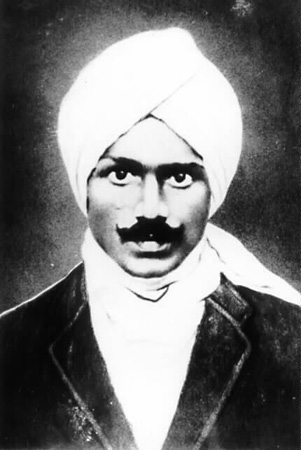About the poet

Attipate Krishnaswami Ramanujan, shortened to AK Ramanujan, was one of the most notable Indian poets and scholars who wrote in both English and Kannada born on16th March, 1929, Mysore. Ramanujan was a poet, scholar, professor, a philologist, folklorist, translator, and playwright. His academic research ranged across five languages: English, Kannada, Tamil, Telugu, and Sanskrit. He published works on both classical and modern variants of this literature and argued strongly for giving local, non-standard dialects their due. Though he wrote widely and in a number of genres, Ramanujan’s poems are remembered as enigmatic works of startling originality, sophistication and moving artistry.
AK Ramanujan’s father, Attipate Asuri Krishnaswami, an astronomer and professor of mathematics at Mysore University, was known for his interest in English, Kannada and Sanskrit languages. His mother was a homemaker. Ramanujan also had a brother, A.K. Srinivasan who was a writer and a mathematician.
Ramanujan was educated at Marimallappa’s High School, Mysore, and at the Maharaja College of Mysore. In college, Ramanujan majored in science in his freshman year, but his father, who thought him ‘not mathematically minded’, persuaded him to change his major from science to English. Later, Ramanujan became a Fellow of Deccan College, Pune in 1958–59 and a Fulbright Scholar at Indiana University in 1959–62. He was educated in English at the University of Mysore and received his PhD in Linguistics from Indiana University.
Ramanujan worked as a lecturer of English at Quilon and Belgaum; he later taught at The Maharaja Sayajirao University in Baroda for about eight years. In 1962, he joined the University of Chicago as an assistant professor. He was affiliated with the university throughout his career, teaching in several departments. He taught at other US universities as well, including Harvard University, University of Wisconsin, University of Michigan, University of California at Berkeley, and Carleton College. At the University of Chicago, Ramanujan was instrumental in shaping the South Asian Studies program. He worked in the departments of South Asian Languages and Civilizations, Linguistics, and with the Committee on Social Thought. AK Ramanujan is a well-known writer in Indian writing in English. He wrote all his poetry in America but the heart of his poetry is India and Indian culture. His experiences about the American lifestyle seems to affect very little in his verses. A. K. Ramanujan’s theoretical] and aesthetic contributions span several disciplinary areas.] In his cultural essays such as “Is There an Indian Way of Thinking?” (1990), he explains cultural ideologies and behavioural manifestations thereof in terms of an Indian psychology he calls “context-sensitive” thinking. In his work in folklore studies, Ramanujan highlights the intertextuality of the Indian oral and written literary tradition. His essay “Where Mirrors Are Windows: Toward an Anthology of Reflections” (1989), and his commentaries in The Interior Landscape: Love Poems from a Classical Tamil Anthology (1967) and Folktales from India, Oral Tales from Twenty Indian Languages (1991) are good examples of his work in Indian folklore studies. His 1991 essay “Three Hundred Ramayanas: Five Examples and Three Thoughts on Translation” courted controversy over its inclusion in the B.A. in History syllabus of the University of Delhi in 2006. In this essay, he wrote of the existence of many versions of Ramayana and a few versions that portrayed Rama and Sita as siblings, which contradicts the popular versions of the Ramayana, such as those by Valmiki and Tulsidas.
A K Ramanujan left us all on 13 July 1993 when he was 64 years old in Chicago, Illinois, United States and has given a new shape to Indian poetry.
About the poem
The poem “WIND” by AK Ramanujan is very beautiful yet with immense powerful language. The poem talks about the action of the wind. The poet asks the wind to come softly without shattering and destroying the fine creation of nature. The poet feels terrible and requests the wind not to break the shutters of the windows, not to scatter the papers and throw down the books from the shelf. But the wind throws the books and tears the pages. The poet says that the wind makes a mockery of weaklings. It brings down frail houses, crumbling doors, rafters, and even weak hearts. It crushes everything that is weak. The only way we can defeat the superior is by staying strong. The poet advises us to be strong. Even though we become vulnerable many times in our life but every time we fall weak, it’s important for us to stand up, grow stronger and fight all the difficulties coming in our way. The poem is basically personified. It actually conveys the idea that nobody cares for the weak. Our bodies and hearts should always be strong. It is the way of the world to kick the weak and to be friends with the strong. The wind blows out the weak fires but makes the strong fires roar and flourish. We must make ourselves strong to become successful and overcome the challenges in life.
Background of the poem
The poem WIND, talks about the adversity of the life that we, human beings, face at every stage while growing up. The poem is personified. It basically talks about how the strong winds destroy the creation of mother earth which are fragile. It breaks the shutters of the windows and scatters the papers and throws down the books, tearing the pages. It basically shows it’s harsh and arrogant nature to the weak since it’s very easy to stand strong in front of the weak and feel superior. But on the other hand, it gives shape to the strong. It nourishes the strong and can never destroy them. The poet talks about how weak people break down easily and strong people emerge out of adversities.
Structure of the poem
Wind, come softly. Don’t break the shutters of the windows. Don’t scatter the papers. Don’t throw down the books on the shelf. There, look what you did — you threw them all down. You tore the pages of the books. You brought rain again. You’re very clever at poking fun at weaklings. Frail crumbling houses, crumbling doors, crumbling rafters, crumbling wood, crumbling bodies, crumbling lives, crumbling hearts — the wind god winnows and crushes them all. He won’t do what you tell him. So, come, let’s build strong homes, Let’s joint the doors firmly. Practise to firm the body. Make the heart steadfast. Do this, and the wind will be friends with us. The wind blows out weak fires. He makes strong fires roar and flourish. His friendship is good. We praise him every day.
The entire poem is a free verse and there is no rhyming scheme in the poem.
There are a few literary devices in the poem WIND by AK Ramanujan. These include:
1. Anaphora – In rhetoric, an anaphora is a rhetorical device that consists of repeating a sequence of words at the beginnings of neighbouring clauses, thereby lending them emphasis.
· Don’t break the shutters of the windows.
Don’t scatter the papers.
Don’t throw down the books on the shelf. (Line 2, 3, 4 start with “don’t”)
· You tore the pages of the books.
You brought rain again.
You’re very clever at poking fun at weaklings. (Line 6, 7, 8 start with “you”)
2. Personification – Personification occurs when a thing or abstraction is represented as a person, in literature or art, as an anthropomorphic metaphor.
Here, WIND has been personified. Line 6, 7, 8 start with YOU. Here, “YOU” is referred to as the WIND where wind is treated as a person.
3. Alliteration – In literature, alliteration is the conspicuous repetition of identical initial consonant sounds in successive or closely associated syllables within a group of words, even those spelt differently.
· Don’t throw down the books on the shelf.
· You tore the pages of the books.
· Frail crumbling houses, crumbling doors, crumbling rafters, crumbling wood, crumbling bodies, crumbling lives, crumbling hearts.
· the wind god winnows and crushes them all.
· He won’t do what you tell him.
4. Onomatopoeia – Onomatopoeia is the process of creating a word that phonetically imitates, resembles, or suggests the sound that it describes.
· Frail crumbling houses, crumbling doors, crumbling rafters, crumbling wood, crumbling bodies, crumbling lives, crumbling hearts.
· the wind god winnows and crushes them all.
